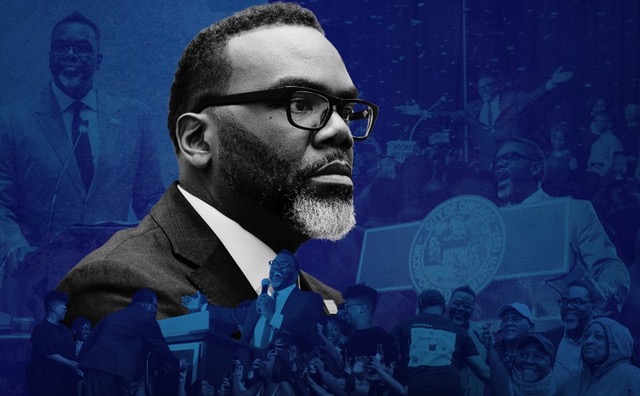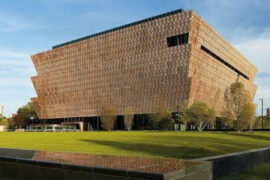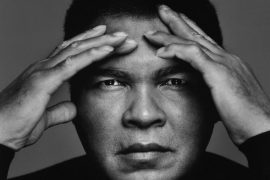Many Black Chicagoans have a deep distrust in government. This isn’t a new occurrence. It’s generational. The cycle of harm has been perpetuated through intentional disinvestment such as the closings of 50 Chicago Public Schools (CPS) in 2013 and six of 12 public mental health centers in 2011, environmental injustices such as the 1995 heat wave and persistent Spring basement flooding, redlining and racially restrictive covenants, mass displacement with the demolition of Chicago Public Housing projects like Cabrini Green and the Robert Taylor Homes and the forthcoming Barack Obama Presidental Center, and countless acts of murder, torture and violence by Chicago police.
That’s what made Bring Chicago Home a tough sell for some Black Chicagoans. And the attack ads referencing harms from the parking meter and lottery deals fanned the flames.
“It’s like with the lottery, they sold us a bill of goods and told us it would be used to bail out the schools and then come to find out no matter how big the lottery is, schools receive just a chunk of that money,” Auburn-Gresham resident Renee Hollaway told The TRiiBE. She’s comparing the Bring Chicago Home ballot question to the Illinois Lottery, which was created as a fund for state public elementary and high schools. However, just 25 percent of the proceeds generated from lottery tickets go toward education.
“With that tax,” she said, referring to real estate transfer tax, “They say it’s really for people in the bigger tax brackets. But who knows how it’ll be used if it’ll trickle down.”
At the same time, the influx of Latin American migrants is deepening the distrust because Black people feel as though they’re being forgotten again.
“I don’t mind them helping people who come from Mexico or wherever they come from,” W.T. Williams, a Hyde Park resident, said, referring to city officials helping Latin American migrants. We’re supposed to help foreigners who come over here, but take care of your people first.”
It’s this generational distrust that Mayor Brandon Johnson has been up against since he won election night on April 4, 2023. On the campaign trail, he pledged to right the longstanding harms that disproportionately affect Black and brown communities by investing in people through affordable housing, accessible mental health services, and holistic approaches to addressing community violence. But trauma is something that doesn’t go away overnight. Johnson has had to navigate the distrust while also bringing them on board with his progressive agenda, which aims to heal those institutional harms.
“Who expected me to defeat white supremacy in one year?” Johnson said. “There were individuals who did not know the full value of what I brought to the mayor’s office, and there were forces working to disrupt that.”
This week, Johnson sat down with The TRiiBE for a one-on-one interview honoring the anniversary of his election. He discussed how he’s delivered on his platform how his targeted investments and policies will address institutional harms in Black communities and how he’s communicating his agenda with Black residents, and the challenges he’s facing while doing so.
In his first year in office, however, there’s been a nationwide political backlash to progressive policies. In response to the summer 2020 uprisings and calls to defund the police and address systemic injustices, right-wing politicians are attacking the progress that was made by reversing Affirmative Action, restricting abortion rights, removing diversity, equity and inclusion positions from public universities, passing anti-trans legislation, and barring public schools teachers from using books and teaching lessons to children about race, LGBTQ+ community, gender, gender identity, and expression.
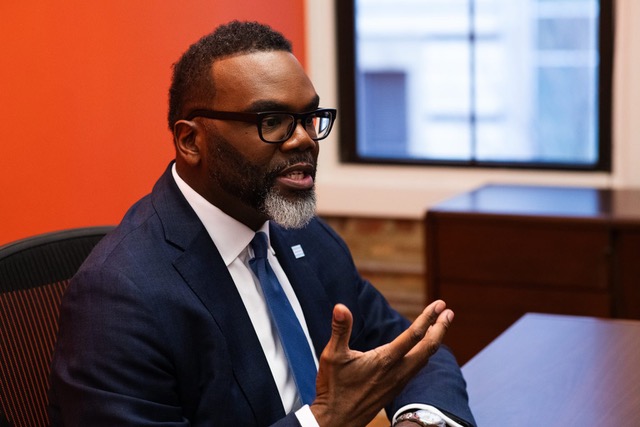
“We’re seeing a resurgence of tough-on-crime mantras and rhetoric, which will only further harm Black people and brown people and increase our already historically high incarceration rates, which have absolutely zero impact on violence, and there’s no correlation between them,” said Aislin Pulley, the Chicago Torture Justice Center executive director. Pulley also founded the Chicago Black Lives Matter chapter in 2014.
“It’s time for us to challenge ourselves and make bold proclamations about the world we want to live in. We don’t have to be satisfied with the limits that have been presented to us,” Pulley said. We can advocate for universal income, an actual robust public health system, including mental and mental health systems, and an end to homelessness. These are manufactured crises, and they don’t have to exist.”
WHAT DO JOHNSON’S PROGRESSIVE AGENDA WINS MEAN FOR BLACK PEOPLE?
For many, progressive wins look like repairing harm. For Aislinn Pulley, who supports progressive organizing, it looks like reparations. She’s been fighting for Black liberation, and with a group of organizers, helped to get a historic Reparations Ordinance approved for survivors of police torture in 2015 The ordinance included $5.5 million in monetary compensation that was paid out to victims, the creation of the Chicago Torture Justice Center, an apology from the mayor and Chicago City Council and more. While funding for the memorial stalled under Emanuel and former mayor Lori Lightfoot’s administrations, Johnson’s administration moved it forward within his first month in office.
On Juneteenth 2023, he announced that the Mellon Foundation is giving $1.8 million in funding to the Chicago Torture Justice Memorial. Johnson also pledged an additional $1 million in funding from the city to support the long-awaited memorial, which will be the first reparations monument of its kind in the US that will memorialize survivors and victims of police torture.
“This shows that when we organize ourselves, no matter what the system’s current dynamics are, if we keep fighting, despite the length of time, we can win,” Pulley said about the torture memorial. “This is an actual example of a decades-long struggle by people who were told that they would never be able to be heard. So this is a story of both trauma and triumph and a small microcosm of the story of Black people in this country.”
Knowing that Black residents are still reeling from decades-long neglect, Johnson pointed to his progressive wins as evidence that he is working to repair harm.
Five months after his inauguration, Johnson and the Chicago City Council passed worker rights measures; one ended the subminimum wage for tipped workers and another guaranteed 10 days of paid time off for Chicago workers.
“We have paid time off, a more substantive approach for workers to actually have paid time off, which will overwhelmingly impact Black workers, if you look at the industries where Black folks are most concentrated,” Johnson said.
“We’re talking about tip workers that are deeply connected to what Black liberation has always been fighting for, which obviously goes back to the Pullman Porters,” he continued, referring to the City Council vote to end subminimum wage.
The latter are measures he campaigned for, and he said each of them is a promise he’s kept and will directly impact Black people.
“We promised Treatment Not Trauma and we’re going to open two mental health clinics this year,” he said. “All of those promises directly benefit Black people. We didn’t raise property taxes the $16.77 billion budget for fiscal year 2024 was balanced,” he added.
For over a decade, organizers, residents and elected officials have pushed for the passage of Treatment Not Trauma to establish 24-hour mental-health crisis response teams within the city’s public health department and deploy them citywide. On Oct. 4, the City Council voted to approve the formation of a working group, the Mental Health System Working Group, to develop a framework to implement Treatment Not Trauma. Treatment Not Trauma was incorporated into the 2024 budget, including reopening two mental health clinics and spending $15.9 million to double the staff of the Chicago Department of Public Health’s Care 911 alternative response program that began under former mayor Lori Lightfoot in 2021.
During his first city budget, he carved out $250 million to invest in homelessness and support services, such as the rapid re-housing and permanent supportive housing programs. Homelessness disproportionately affects Black Chicagoans
“I recognize that Black Chicago has been made sore because of previous administrations. The disinvestment is well documented. So that’s why we made a commitment to a quarter of a billion dollars into homelessness. “Seventy percent of those experiencing homelessness are Black,” he said.
Relatedly, this week, he announced La Salle Street Imagined, a project in the Loop that would create 1,000 units of mixed-use housing, including 300 affordable units. In February, he also proposed borrowing $1.25 billion from the city over the next five years to fund affordable housing and commercial and economic development. The proposal needs approval from the City Council before going into effect.
“The $1.25 billion bonds deal, we’re talking about $600 million that will be available for commercial and economic development along our corridors and $600 million dollars for housing and affordable rent,” Johnson said.
As a former CPS educator, Johnson has maintained his commitment to engaging with young people and expanding youth employment opportunities as a violence prevention approach, instead of tough on crime rhetoric.
This summer, the city will employ up to 28,000 young people citywide. The 2024 budget also appropriates an additional $76 million to expand youth employment opportunities. Sixty percent of the young people who received jobs last year were Black, Johnson said.
“I made a commitment to hire more young people. We added an additional $76 million on top of our investments from the previous year to youth employment,” Johnson said.
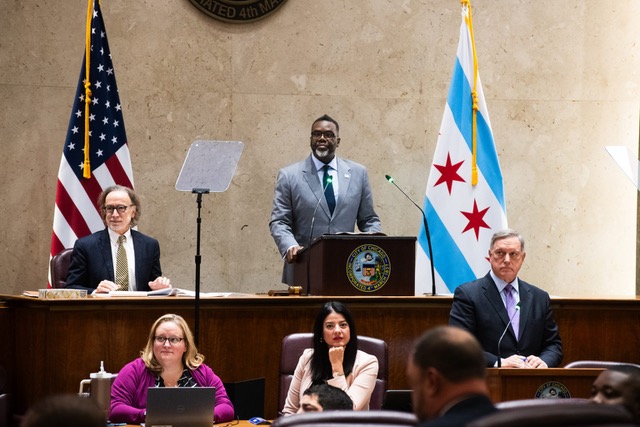
Johnson also pointed to other budget investments, including the first-of-its-kind Department of Reentry for formerly incarcerated people, which will assist them with employment and housing and other wraparound supports. Black people are incarcerated at Cook County Jail more than 17 times the rate of white people, according to an analysis by Injustice Watch.
In November, the Johnson administration created a City Council subcommittee to study reparations for Black Chicagoans. The 2024 budget appropriated $500,000 for the department. A reparations subcommittee was also formed under Lightfoot’s administration, but it only met twice and didn’t receive funding, according to a WTTW news report.
“We also put forth about half a million dollars for reparations. The down payments that are made on Black Chicago alone have outpaced the investments, or I should say, the limited consideration from the previous administration. So we’re just getting started,” Johnson said.
TRANSPARENCY AND ACCOUNTABILITY
Though Johnson is making strides to follow through on campaign pledges, sometimes the messages of his wins aren’t reaching everyone. Over the course of his first year in office, communications from the Johnson administration regarding migrant shelters and care and other issues, like the back-and-forth over the decision to end ShotSpotter, have sparked criticism and come under fire from the public and the press. However, Johnson’s unique approach of meeting residents face to face demonstrates a genuine effort to listen and respond to their concerns, a stark departure from traditional governance. He believes in the power of direct communication to bring his message directly to the people.
One example of this is a a March community event at Percy L. Julian High School, where Johnson, CPS CEO Pedro Martinez, and Ald. Ronnie Mosley (21st Ward) announced plans to build a new state-of-the-art athletic field complex for students and area residents.
Speaking on an interaction with a Black Chicago resident who attended the event, Johnson recalled, “A woman chased me down as I was exiting, and she looked bewildered, frustrated, embarrassed, and angry. She said, ‘ Mayor Johnson, I didn’t know any of these things were happening.’ But what I took from that was she was coming to [that event] give me the business. I know our people,” he told The TRiiBE.
“I don’t agree with the notion that I’m not transparent. In fact, it is not uncommon to refer to a Black man as not transparent. Everything and anything that is to be known about this mission, the people of Chicago know it, or they have access to it,” he said.
Three watchdog groups, the Better Government Association, the Civic Federation, and the League of Women Voters of Chicago, have also criticized the Johnson administration for its lack of transparency. In an editorial, they urged the Johnson administration and Ald. Michelle Harris (8th Ward) to improve the transparency of council meetings and committee agenda items by revising rules and posting meeting agendas four business days before committee votes, among other recommendations. Press members have also expressed frustration with receiving records through Freedom of Information Act requests.
However, Johnson’s approach is taking his message directly to the people.
“I’m going to continue talking to people. I talked to more people in one day than the press talked to in a month, and that’s a big lift because there are 2.7 million people [in Chicago]. As often as we can, we’re going to continue to get our message out,” he said.
Delmarie Cobb, a veteran journalist and political strategist, explained that Johnson needs to continue to be out in the community and include residents in his decision-making to quiet the noise and ensure that his message and agenda items are accessible to Black residents.
“Transparency means engaging the community first, not engaging them once you’ve been caught. As I always say, the hallmark of being a progressive is transparency. Every progressive talks about transparency, so you can’t get into the office and not be transparent because then it becomes business as usual.”
Much of Johnson’s first year in office has been dominated by the influx of Latin American migrants sent to Chicago and other sanctuary cities. Since 2022, more than 30,000 have arrived in Chicago by Republican Gov. Greg Abbott in an act of political theater.
“There is no way a Black governor could pull off what he’s doing. Just no way,” Johnson said. “If a Black governor was shipping people all over the country right now, there’s no way that person would not be repudiated by everyone.”
Over the past year and a half, the city has spent $300 million to provide essential services for migrants while they work to resettle, find jobs and homes, build new lives for themselves and to support loved ones back home. To date, 9,899 asylum seekers are staying in the city’s 31 shelters, according to city data.
Johnson has attempted to set up shelters in majority-Black neighborhoods, but residents have pushed back. He proposed setting up shelters in Morgan Park and Galewood last fall, but put those plans on pause. Wadsworth Elementary School, a shuttered CPS school in Woodlawn, was repurposed as a shelter under Lightfoot’s administration and that has caused tension. They also expressed that they don’t feel included in the decision-making process as the city has proposed opening up new shelter sites in Chicago Park districts.
“What about the people who have been here and need help and they haven’t been helped,” said Linda, an Auburn Gresham resident. (Linda declined to give her last name). “That’s my concern. We all need help. As soon as somebody comes, they get it immediately. I just don’t think that’s fair when there are people that’s been sitting here years and outside and homeless, and they haven’t gotten the help that they need.”
These actions have created tension between many Black Chicagoans in underserved neighborhoods and migrants who are fleeing economic and political strife. Residents have expressed their pain, frustration and confusion with city officials during community and City Council meetings.
For decades, Black residents have asked the city for assistance with affordable housing assistance, mental health services, access to employment opportunities and quality public schools, among many other concerns.
“I understand the hardship that this [humanitarian crisis] caused for people, but there were Park Districts that we utilized. There were people who were made aware that it was coming or could come,” Johnson said. “There’s a difference between not wanting it [there] and not being aware that we were considering it. People were made aware.”
Then there’s political maneuvering and messaging at the hands of his critics who represent corporate interests, and a bloc of City Council members, including Alds. Anthony Beale (9th Ward), Raymond Lopez (15th Ward), and Brendan Reilly (42nd Ward) publicly organized and sowed misinformation against policies that he campaigned on, like the Bring Chicago Home ballot question.
Bring Chicago Home called for increasing the real estate transfer tax — a one-time tax levied on property sales — to create a designated revenue stream to provide permanent housing for people experiencing homelessness.
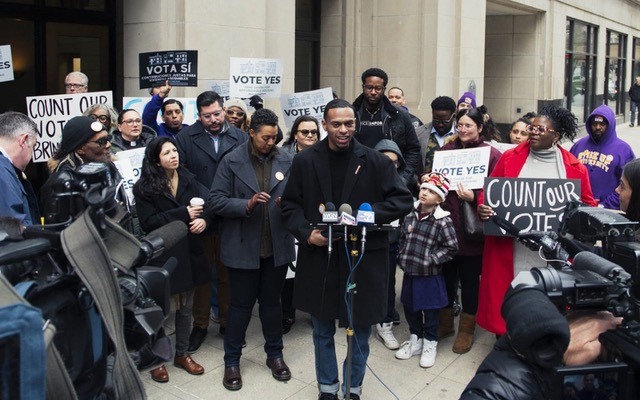
Ultimately, more than half of the 390,697 city voters who voted in the Illinois Primary Election rejected the Bring Chicago Home ballot question: 184,890 voted against the proposal, and 167,492 voted in favor of it. Voter turnout was about 25 percent citywide, lower than in the previous Illinois primary election.
“We have to do everything in our power to increase voter turnout, but if you look at who actually voted for it, it’s the people who experienced the most pain. Black people, quite frankly, they’re very clear about what our work is,” Johnson said.
Johnson said that whether it is reported or not, he will continue to enact his agenda items and engage with the community while ensuring their wins and messages reach Black people.
“We’ll continue to knock on doors. We’ll continue to talk to people and bring policy that impacts our people, in particular when the time is right and when people have the appetite and are ready to figure out the path going forward. I will be on the front line like I’ve always been,” he said.
Tonia Hill is a multimedia reporter for The TRiiBE.


